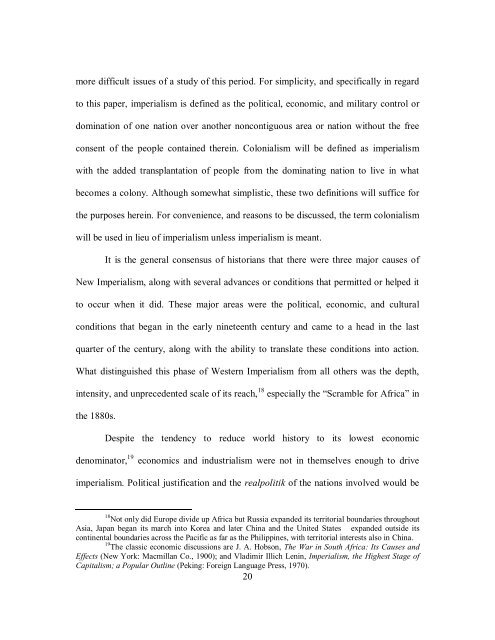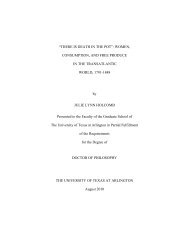EARLY BELGIAN COLONIAL EFFORTS - The University of Texas at ...
EARLY BELGIAN COLONIAL EFFORTS - The University of Texas at ...
EARLY BELGIAN COLONIAL EFFORTS - The University of Texas at ...
You also want an ePaper? Increase the reach of your titles
YUMPU automatically turns print PDFs into web optimized ePapers that Google loves.
more difficult issues <strong>of</strong> a study <strong>of</strong> this period. For simplicity, and specifically in regard<br />
to this paper, imperialism is defined as the political, economic, and military control or<br />
domin<strong>at</strong>ion <strong>of</strong> one n<strong>at</strong>ion over another noncontiguous area or n<strong>at</strong>ion without the free<br />
consent <strong>of</strong> the people contained therein. Colonialism will be defined as imperialism<br />
with the added transplant<strong>at</strong>ion <strong>of</strong> people from the domin<strong>at</strong>ing n<strong>at</strong>ion to live in wh<strong>at</strong><br />
becomes a colony. Although somewh<strong>at</strong> simplistic, these two definitions will suffice for<br />
the purposes herein. For convenience, and reasons to be discussed, the term colonialism<br />
will be used in lieu <strong>of</strong> imperialism unless imperialism is meant.<br />
It is the general consensus <strong>of</strong> historians th<strong>at</strong> there were three major causes <strong>of</strong><br />
New Imperialism, along with several advances or conditions th<strong>at</strong> permitted or helped it<br />
to occur when it did. <strong>The</strong>se major areas were the political, economic, and cultural<br />
conditions th<strong>at</strong> began in the early nineteenth century and came to a head in the last<br />
quarter <strong>of</strong> the century, along with the ability to transl<strong>at</strong>e these conditions into action.<br />
Wh<strong>at</strong> distinguished this phase <strong>of</strong> Western Imperialism from all others was the depth,<br />
intensity, and unprecedented scale <strong>of</strong> its reach, 18 especially the “Scramble for Africa” in<br />
the 1880s.<br />
Despite the tendency to reduce world history to its lowest economic<br />
denomin<strong>at</strong>or, 19 economics and industrialism were not in themselves enough to drive<br />
imperialism. Political justific<strong>at</strong>ion and the realpolitik <strong>of</strong> the n<strong>at</strong>ions involved would be<br />
18<br />
Not only did Europe divide up Africa but Russia expanded its territorial boundaries throughout<br />
Asia, Japan began its march into Korea and l<strong>at</strong>er China and the United St<strong>at</strong>es expanded outside its<br />
continental boundaries across the Pacific as far as the Philippines, with territorial interests also in China.<br />
19<br />
<strong>The</strong> classic economic discussions are J. A. Hobson, <strong>The</strong> War in South Africa: Its Causes and<br />
Effects (New York: Macmillan Co., 1900); and Vladimir Illich Lenin, Imperialism, the Highest Stage <strong>of</strong><br />
Capitalism; a Popular Outline (Peking: Foreign Language Press, 1970).<br />
20
















